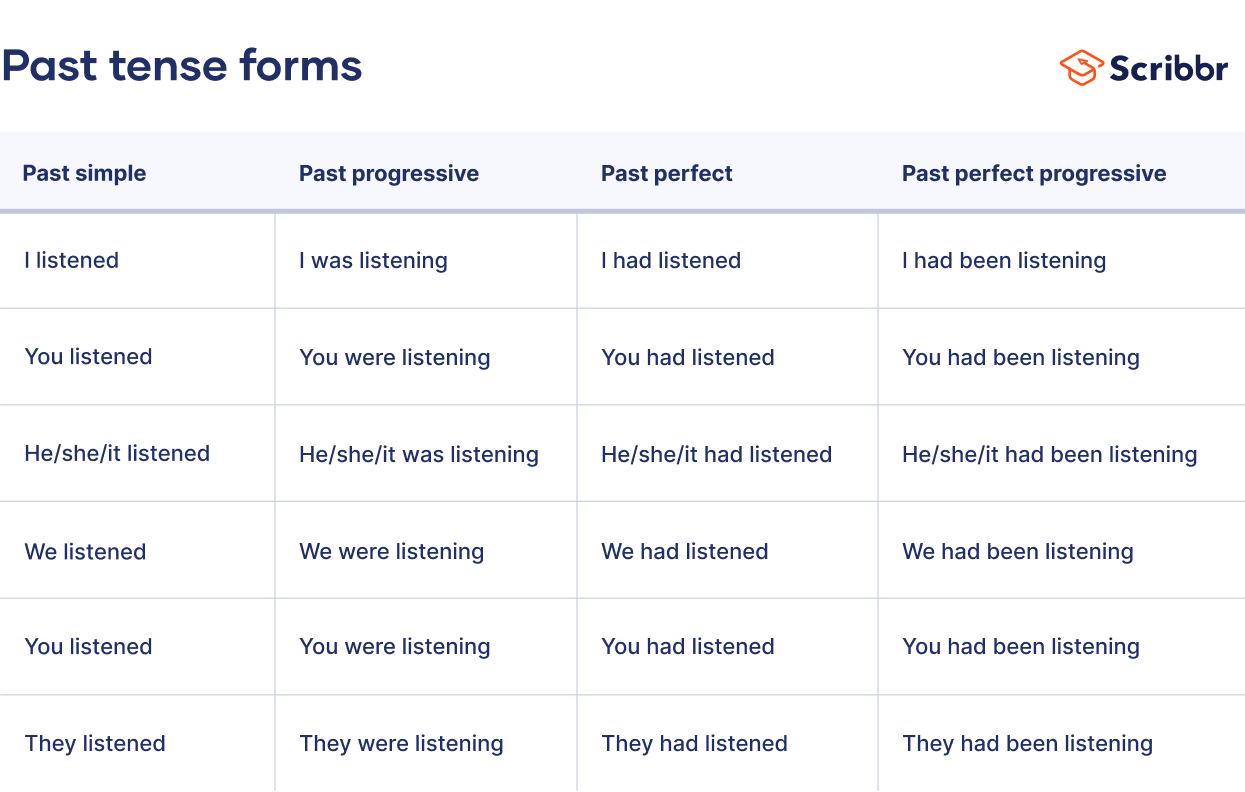The Past Tense l Explanation, Examples & Worksheet
The past tense is a verb tense used to talk about past actions, states of being, or events.
There are four past tense forms: the past simple (e.g., “you cooked”), the past progressive (e.g., “he was singing”), the past perfect (e.g., “I had arrived”), and the past perfect progressive (e.g., “They had been driving”).
Simple past
The simple past tense is used to talk about actions or events that were completed in the past.
The simple past of regular verbs is formed by adding “-ed” to the end of the infinitive form (e.g., “cook” becomes “cooked”). The past tense of irregular verbs don’t follow a particular pattern and can be formed in various ways (e.g., “sing” becomes “sang”).
Most verbs in the simple past don’t change form depending on the subject. One exception is the irregular verb “be”, which is conjugated as either “was” or “were”, depending on the subject.
Aria was late for work yesterday.
We watched a movie last Friday night.
Joseph graduated from college in 2020.
Past progressive
The past progressive is used to refer to an action or event that was taking place at a time in the past. It can be used to indicate that an ongoing past action was interrupted by another action or that two past actions were occurring at the same time.
The past progressive is formed using the past tense of “be” (i.e., “was/were”) along with the present participle (“-ing” form) of the main verb.
Amir was studying while his roommate was cooking dinner.
We were hiking in the mountains when we saw a bear.
I was chopping onions when I cut my finger.
Past perfect
The past perfect is used to indicate that a past action or event took place prior to another past action or event. It can also be used in conditional sentences to talk about a hypothetical past event.
The past perfect is formed using the auxiliary verb “had” and the past participle of the main verb.
I had never tasted Sushi until last night.
By the time we arrived at the theatre, the movie had already started.
If you had invited me, I would have gone to your party.
Past perfect progressive
The past perfect progressive is used to indicate that an action began in the past and continued up until another time in the past.
The past perfect progressive is formed by adding the auxiliary verbs “had” and “been” before the present participle of the main verb.
Amy had been cooking for hours when the guests cancelled.
I had been searching for my missing keys when I realised they were in my pocket.
They had been living in the neighbourhood for weeks before they met their neighbours.
Worksheet: Past tense
Practise using the past tense correctly with the exercises below. In the blank space in each sentence, fill in the correct past tense form based on the verb specified.
- I was __________ [cook] dinner when you called.
- Anna __________ [play] piano when she was a child.
- Dave had been __________ [work] as a teacher when he won the lottery.
- Eva had already __________ [leave] the office by the time I arrived.
- I was cooking dinner when you called.
- This sentence uses the past progressive. The past progressive is formed using “was/were” along with the present participle (“-ing” form) of the main verb.
- Anna played piano when she was a child.
- This sentence uses the simple past. The simple past of regular verbs is formed by adding “-ed” to the end of the infinitive of the verb (e.g., “play” becomes “played”).
- Dave had been working as a teacher when he won the lottery.
- This sentence is in the past perfect progressive. The past perfect progressive is formed using “had” and “been” along with the present participle of the main verb.
- Eva had already left the office by the time I arrived.
- This sentence is in the past perfect. The past perfect is formed using “had” and the past participle of the main verb.
Frequently asked questions about the past tense
Cite this Scribbr article
If you want to cite this source, you can copy and paste the citation or click the ‘Cite this Scribbr article’ button to automatically add the citation to our free Reference Generator.
Ryan, E. (2023, November 01). The Past Tense l Explanation, Examples & Worksheet. Scribbr. Retrieved 2 July 2025, from https://www.scribbr.co.uk/verb/the-past-tense/




